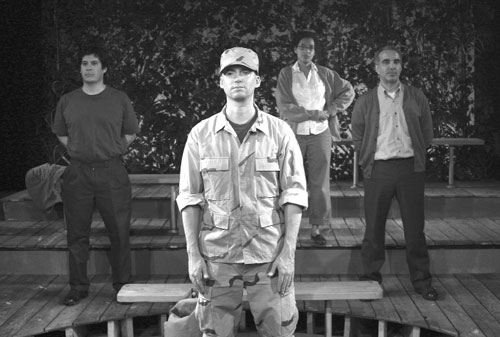By Steven Snyder
“Elliot, A Soldier’s Fugue”
Directed by: Davis McCallum
Through Feb. 19
45 Below, at The Culture Project
45 Bleecker St., at Lafayette St.
(212-352-3101, www.p73.org)
What begin’s as one soldier’s story, portrayed by Armando Riesco, center, becomes a mosaic of wartime existence comprising three generations: his father (Triney Sandoval, left), mother (Zabryna Guevara, back), and grandfather (Mateo Gómez, right). Monique Carboni, photo.
Though Quiara Alegria Hudes’s “Elliot, A Soldier’s Fugue” starts as the story of one man and one war, focused on the here-and-now struggles of a soldier deployed to the desert, it quickly evolves into a far richer patchwork of four distinct memoirs, each steeped in issues of heritage, history and the concept of heroism.
In comparing the Iraq war to wars past, Hudes’s story reaches beyond the politics and pressures of this particular conflict to a collection of more universal observations — of what war means for the person, the family and the society from generation to generation.
It’s called a fugue due to the four stories that run beside each other, linking the present with the past, told by four characters with similar experiences overseas. The first, and most dynamic, is Elliot (Armando Riesco), a young soldier of the digital age, back from Iraq on medical leave for an injured leg. Then there’s Pop (Triney Sandoval), Elliot’s father, who appears through flashbacks during his days in Vietnam, and Ginny (Zabryna Guevara), Elliot’s mother, a Vietnam War nurse who now gardens to cope with the stresses of having a son at war, using seeds and soil to create a small homage to her native Puerto Rico. Fourth is Grandpop (Mateo Gomez), Elliot’s grandfather, who leaves his native island for the horrors of the Korean War halfway around the globe.
As the play jumps wildly between characters and decades, it is impressive how these four, divided stories blend together so seamlessly. To this end, Hudes uses overlapping dialogue to blur the boundaries between one’s memoir and the others as they often finish each other’s thoughts and sentences. Director Davis McCullough augments these speeches with a perpetual sense of motion, giving the text a shot of momentum that makes each gesture and posture a more immediate piece of the larger puzzle.
When the story finally starts to slow, we see the frailties and fears that have been running behind the surface. Grandpop is a family man who heads off to war with nothing but a flute, which he plays to distance himself from the horror. Pop is a naïve young man, who takes his father’s flute with him to war though he knows not how to play, and eventually has his high spirits shattered as his tour drags on.
All the while Elliot copes with the new horrors of modern war. He’s the soldier who shoots from afar and, when wounded, becomes a media-finessed celebrity back home. He suddenly finds himself a hero, albeit a carefully-constructed hero, shaped and molded by reporters and TV producers to reflect a certain version of war and the American soldier.
The actors keep us engaged not only with the stories these characters have to share, but in the way they choose to share it. Riesco, in particular, captures the pragmatic do-or-die resolve of the fresh soldier, while Guevara is the play’s reliable, commanding foundation, exuding sensitivity as a loving mother at center stage and confidence as a narrator observing the men’s stories from afar.
“Elliot’s” lasting theme, though, has less to do with four voices in harmony than four voices lost in the dissonance. At one point, in describing the structure of a fugue, Grandpop says, “Two, three, four lines clashing. You think, good god, they’ll never untie themselves. How did this mess get started in the first place?
“It’s all about untying the knot,” he says.
Yet while these men unearth their similarities, they also discover the hardships that none of them can overcome: The loss of connection to their heritage, the exploitation of heroes in a media-driven society, the racial inequities of both the military and the society at large, and even the breakdown of communication within a family.
In this respect, “A Soldier’s Fugue” is really just a primer for a more despairing and unsettling discussion about any country’s justification for war —a larger debate it does not claim to answer.



























